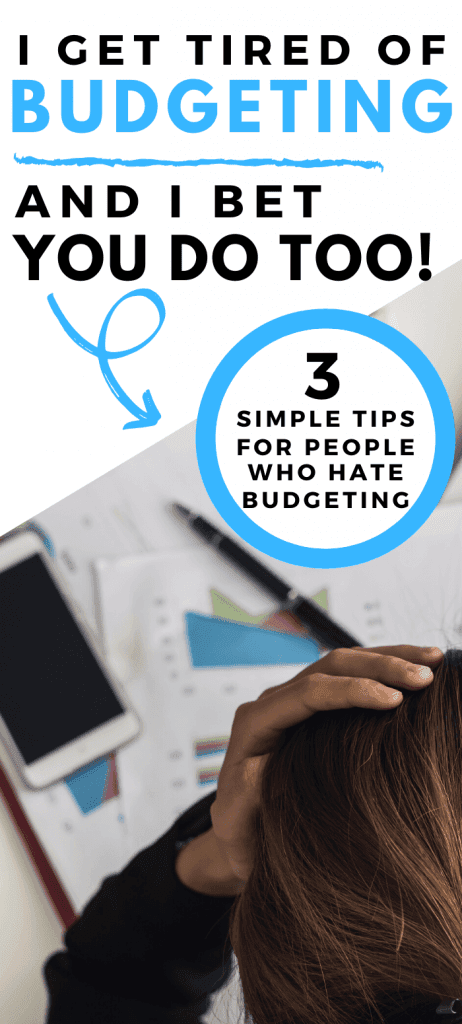

3 Budget Tips for People Who Hate Budgeting
3 Budget Tips for People Who Hate Budgeting
3 Budget Tips for People Who Hate Budgeting
Jul 4, 2019
Budgeting >
Budgeting >
Challenges & Solutions
Challenges & Solutions
Do you absolutely hate the idea of a budget?
Well, stick around, because these budget tips will have you loving your budget in no time!
It's no secret that one of the best ways to take control of your finances is to start budgeting.
Unfortunately, many people shun budgeting either because they feel it’s too constricting or complicated. They can't stick with it for one reason or another so they give up completely.
But it doesn't have to be that way.
If you've struggled with budgeting in the past, try these budget tips to ease yourself back in and create a budget that works for you.
Budget Tip #1 - Focus on Your Priorities, Not Your Sacrifices

Many people begin a new budget like they do a new diet - by looking for things to eliminate from their lives.
This instantly creates a combative attitude toward your budget.
Instead, start with your priorities.
What expenses bring you joy? Not necessarily an excitement to pay the bill, but a service or expense that makes you happy.
A lot of people start trying to save money in their budget by eliminating what they view as frivolous spending.
But if taking your family to the movies every Friday night brings you joy and the promise of a lifetime of memories, then make room in the budget for it.
That's what prioritizing is all about.
Yes, you may need to give up some things, but when you frame it as “What am I willing to give up to be able to do this thing I love?” it won’t lead to you viewing your budget as the enemy.
Budget Tip #2 - Keep It Simple
You don’t need fancy software (though I love and swear by YNAB) or complicated spreadsheets and systems to be successful at budgeting.
Start with a simple sheet of paper or download one of my free budget templates.
Brainstorm Some Spending & Savings Categories
Brainstorm your biggest spending and savings categories and list them out. Some common ones are:
Housing
Transportation
Food
Phone
Entertainment
Insurance
Internet
Utilities
Giving
Savings Goals
You may want to split up the categories a bit more, like separating out your groceries from your dining out, but it’s important to keep things simple as you start.
Wait to add more granular categories until you've adapted to the system and become more comfortable with using it.
As you begin recording your purchases, you’ll develop a better idea of what other categories would help you stay on track.
Budget By Paycheck
Another common problem people have with budgeting is trying to make their money stretch to fit the month. This can be a super stressful and depressing approach if you're in debt or living paycheck to paycheck.
Instead, try budgeting per paycheck. Ask yourself "What does this money need to do before I get paid again?"
Budget out your bills and living expenses coming up before your next paycheck and ignore everything else.
If you're lucky enough to have anything left over between paychecks, assign it to a savings goal.
For example, let's say you get paid $1500 on the 1st and 15th and your bills look like this:
1st - rent - $900
3rd - internet - $50
7th - cell phone - $100
18th - car payment - $300
20th - credit card - $300
24th - utilities - $300
This is how you'd budget:

In this example, you can see how budgeting by paycheck can help you not just feel more confident in your budget, but also help you save.
By splitting things up, you can save $250 per month, whereas if you tried to budget the whole month on the first, you'd have run out of money before you could get through your bills, let alone your living expenses.
This is hands down the best way to break the paycheck-to-paycheck cycle. It provides awareness and intentionality to your budget while keeping things simple and doable.
Budget Tip #3 - Roll With the Punches
Learning to adapt is probably the most important thing you can do to keep yourself committed to budgeting.
So many people try predicting their expenses and then throw in the towel when something doesn't go according to plan.
Even if you happen to be a clairvoyant, I doubt you can accurately predict everything that's going to happen in the future.
But you can adjust for any unexpected expenses by simply changing your budget.
Your budget isn’t set in stone; it’s just a reflection of your priorities.
If you have unexpected expenses, that just means you need to reassess your priorities.
For example, sudden and unexpected car repairs may mean you need to skip the weekly dinner out for a few months to get caught back up.
Your Budget Isn't a Contract, It's a Roadmap
Remember that your budget isn't some rigid document meant to restrain you and hold you hostage. It's simply a plan for how you want to save and spend your money.
You may need to make a detour every so often and re-route to get back on track, but that's the beauty of a budget. Because it represents your plan, you can change it whenever you want or need to.
Life happens.
Focus on your priorities, keep it simple and adjust when you need to and you'll begin to build a budget that you can stick with and even enjoy.
Do you absolutely hate the idea of a budget?
Well, stick around, because these budget tips will have you loving your budget in no time!
It's no secret that one of the best ways to take control of your finances is to start budgeting.
Unfortunately, many people shun budgeting either because they feel it’s too constricting or complicated. They can't stick with it for one reason or another so they give up completely.
But it doesn't have to be that way.
If you've struggled with budgeting in the past, try these budget tips to ease yourself back in and create a budget that works for you.
Budget Tip #1 - Focus on Your Priorities, Not Your Sacrifices

Many people begin a new budget like they do a new diet - by looking for things to eliminate from their lives.
This instantly creates a combative attitude toward your budget.
Instead, start with your priorities.
What expenses bring you joy? Not necessarily an excitement to pay the bill, but a service or expense that makes you happy.
A lot of people start trying to save money in their budget by eliminating what they view as frivolous spending.
But if taking your family to the movies every Friday night brings you joy and the promise of a lifetime of memories, then make room in the budget for it.
That's what prioritizing is all about.
Yes, you may need to give up some things, but when you frame it as “What am I willing to give up to be able to do this thing I love?” it won’t lead to you viewing your budget as the enemy.
Budget Tip #2 - Keep It Simple
You don’t need fancy software (though I love and swear by YNAB) or complicated spreadsheets and systems to be successful at budgeting.
Start with a simple sheet of paper or download one of my free budget templates.
Brainstorm Some Spending & Savings Categories
Brainstorm your biggest spending and savings categories and list them out. Some common ones are:
Housing
Transportation
Food
Phone
Entertainment
Insurance
Internet
Utilities
Giving
Savings Goals
You may want to split up the categories a bit more, like separating out your groceries from your dining out, but it’s important to keep things simple as you start.
Wait to add more granular categories until you've adapted to the system and become more comfortable with using it.
As you begin recording your purchases, you’ll develop a better idea of what other categories would help you stay on track.
Budget By Paycheck
Another common problem people have with budgeting is trying to make their money stretch to fit the month. This can be a super stressful and depressing approach if you're in debt or living paycheck to paycheck.
Instead, try budgeting per paycheck. Ask yourself "What does this money need to do before I get paid again?"
Budget out your bills and living expenses coming up before your next paycheck and ignore everything else.
If you're lucky enough to have anything left over between paychecks, assign it to a savings goal.
For example, let's say you get paid $1500 on the 1st and 15th and your bills look like this:
1st - rent - $900
3rd - internet - $50
7th - cell phone - $100
18th - car payment - $300
20th - credit card - $300
24th - utilities - $300
This is how you'd budget:

In this example, you can see how budgeting by paycheck can help you not just feel more confident in your budget, but also help you save.
By splitting things up, you can save $250 per month, whereas if you tried to budget the whole month on the first, you'd have run out of money before you could get through your bills, let alone your living expenses.
This is hands down the best way to break the paycheck-to-paycheck cycle. It provides awareness and intentionality to your budget while keeping things simple and doable.
Budget Tip #3 - Roll With the Punches
Learning to adapt is probably the most important thing you can do to keep yourself committed to budgeting.
So many people try predicting their expenses and then throw in the towel when something doesn't go according to plan.
Even if you happen to be a clairvoyant, I doubt you can accurately predict everything that's going to happen in the future.
But you can adjust for any unexpected expenses by simply changing your budget.
Your budget isn’t set in stone; it’s just a reflection of your priorities.
If you have unexpected expenses, that just means you need to reassess your priorities.
For example, sudden and unexpected car repairs may mean you need to skip the weekly dinner out for a few months to get caught back up.
Your Budget Isn't a Contract, It's a Roadmap
Remember that your budget isn't some rigid document meant to restrain you and hold you hostage. It's simply a plan for how you want to save and spend your money.
You may need to make a detour every so often and re-route to get back on track, but that's the beauty of a budget. Because it represents your plan, you can change it whenever you want or need to.
Life happens.
Focus on your priorities, keep it simple and adjust when you need to and you'll begin to build a budget that you can stick with and even enjoy.
Do you absolutely hate the idea of a budget?
Well, stick around, because these budget tips will have you loving your budget in no time!
It's no secret that one of the best ways to take control of your finances is to start budgeting.
Unfortunately, many people shun budgeting either because they feel it’s too constricting or complicated. They can't stick with it for one reason or another so they give up completely.
But it doesn't have to be that way.
If you've struggled with budgeting in the past, try these budget tips to ease yourself back in and create a budget that works for you.
Budget Tip #1 - Focus on Your Priorities, Not Your Sacrifices

Many people begin a new budget like they do a new diet - by looking for things to eliminate from their lives.
This instantly creates a combative attitude toward your budget.
Instead, start with your priorities.
What expenses bring you joy? Not necessarily an excitement to pay the bill, but a service or expense that makes you happy.
A lot of people start trying to save money in their budget by eliminating what they view as frivolous spending.
But if taking your family to the movies every Friday night brings you joy and the promise of a lifetime of memories, then make room in the budget for it.
That's what prioritizing is all about.
Yes, you may need to give up some things, but when you frame it as “What am I willing to give up to be able to do this thing I love?” it won’t lead to you viewing your budget as the enemy.
Budget Tip #2 - Keep It Simple
You don’t need fancy software (though I love and swear by YNAB) or complicated spreadsheets and systems to be successful at budgeting.
Start with a simple sheet of paper or download one of my free budget templates.
Brainstorm Some Spending & Savings Categories
Brainstorm your biggest spending and savings categories and list them out. Some common ones are:
Housing
Transportation
Food
Phone
Entertainment
Insurance
Internet
Utilities
Giving
Savings Goals
You may want to split up the categories a bit more, like separating out your groceries from your dining out, but it’s important to keep things simple as you start.
Wait to add more granular categories until you've adapted to the system and become more comfortable with using it.
As you begin recording your purchases, you’ll develop a better idea of what other categories would help you stay on track.
Budget By Paycheck
Another common problem people have with budgeting is trying to make their money stretch to fit the month. This can be a super stressful and depressing approach if you're in debt or living paycheck to paycheck.
Instead, try budgeting per paycheck. Ask yourself "What does this money need to do before I get paid again?"
Budget out your bills and living expenses coming up before your next paycheck and ignore everything else.
If you're lucky enough to have anything left over between paychecks, assign it to a savings goal.
For example, let's say you get paid $1500 on the 1st and 15th and your bills look like this:
1st - rent - $900
3rd - internet - $50
7th - cell phone - $100
18th - car payment - $300
20th - credit card - $300
24th - utilities - $300
This is how you'd budget:

In this example, you can see how budgeting by paycheck can help you not just feel more confident in your budget, but also help you save.
By splitting things up, you can save $250 per month, whereas if you tried to budget the whole month on the first, you'd have run out of money before you could get through your bills, let alone your living expenses.
This is hands down the best way to break the paycheck-to-paycheck cycle. It provides awareness and intentionality to your budget while keeping things simple and doable.
Budget Tip #3 - Roll With the Punches
Learning to adapt is probably the most important thing you can do to keep yourself committed to budgeting.
So many people try predicting their expenses and then throw in the towel when something doesn't go according to plan.
Even if you happen to be a clairvoyant, I doubt you can accurately predict everything that's going to happen in the future.
But you can adjust for any unexpected expenses by simply changing your budget.
Your budget isn’t set in stone; it’s just a reflection of your priorities.
If you have unexpected expenses, that just means you need to reassess your priorities.
For example, sudden and unexpected car repairs may mean you need to skip the weekly dinner out for a few months to get caught back up.
Your Budget Isn't a Contract, It's a Roadmap
Remember that your budget isn't some rigid document meant to restrain you and hold you hostage. It's simply a plan for how you want to save and spend your money.
You may need to make a detour every so often and re-route to get back on track, but that's the beauty of a budget. Because it represents your plan, you can change it whenever you want or need to.
Life happens.
Focus on your priorities, keep it simple and adjust when you need to and you'll begin to build a budget that you can stick with and even enjoy.
Need some help?
Whether you're struggling to stick to a budget, overwhelmed with debt, or just wanting to feel a bit more in control, I'm happy to guide you toward your best next step.
Need some help?
Whether you're struggling to stick to a budget, overwhelmed with debt, or just wanting to feel a bit more in control, I'm happy to guide you toward your best next step.
Need some help?
Whether you're struggling to stick to a budget, overwhelmed with debt, or just wanting to feel a bit more in control, I'm happy to guide you toward your best next step.
You're in good hands




You're in good hands




You're in good hands




© 2024 GO FROM BROKE
This site may contain affiliate links. As an Amazon Associate, I earn from qualifying purchases. Please read my disclosure policy for more info.
© 2024 GO FROM BROKE
This site may contain affiliate links. As an Amazon Associate, I earn from qualifying purchases. Please read my disclosure policy for more info.
© 2024 GO FROM BROKE
This site may contain affiliate links. As an Amazon Associate, I earn from qualifying purchases. Please read my disclosure policy for more info.